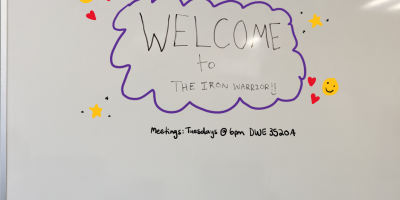Hello dear readers! I hope you all had a fantastic Canada Day weekend!
Like most people who are fortunate to live in this great country, I always have a good time celebrating Canada Day. As a country that didn’t gain its independence through fire and blood, it takes a little bit more imagination to find the things we can do to celebrate our “Canadianness”. So, for instance, this year on Canada Day morning, I first got up and ate some pancakes smothered in maple syrup while listening to the CBC. Then I went out in my thick red-and-white jacket and boots and got a double-double from Tim’s, while being polite to the cashier and everyone else there. After that, I built an igloo and chilled with my polar bear friends for a bit. Finally, I went home, cracked open a couple of Molson Canadians, and watched hockey all night. And that’s pretty much par for the course on Canada Day.
Ok, so maybe Canada Days don’t happen like that in real life. (Aside from the maple syrup and the double-double – those really did happen this year.) What I truly enjoy about Canada Day is the way this country brings people together. It’s not uncommon for people from all backgrounds and walks of life to appear at Canada Day celebrations, and the best part is that no one thinks twice about it. Here in Canada, we don’t care who you are or where you’re from – you’ll always be invited to the party.
Another thing I find amazing is that anyone here in Canada who is from a different country, or who has parents who come from different countries, manages to integrate perfectly into Canadian culture, while at the same time keeping their own cultural traditions very much alive, in a country different from their own. Other countries manage this, to a certain extent, but I don’t think there’s anywhere in the world where cultural diversity is celebrated as much as Canada. Being “proud to be Canadian” doesn’t mean that we are proud that our culture is better than other cultures. It means that when we put all our cultures together, we are proud that we all make up more than the sum of our parts.
But this national pride should come with the responsibility of representing equality and tolerance, and of fighting with what means we can the violence and the hatred that we hear about so often these days. Let’s take Brexit, for instance. Looking back at history, the Battle of the Somme, the bloodiest battle of the First World War, began on July 1st exactly one hundred years ago. Would the thousands of soldiers who died on that morning a hundred years ago be proud of the British people today? Would they be happy that the people of the UK, through silly ignorance mixed with a bit of racism, voted to leave an organization that was created to ensure that the Somme never happened again? I don’t think so – and so it’s our responsibility, as Canadians, to condemn steps in the wrong direction like Brexit, and to promote diversity and encourage tolerance.
Speaking of Canada Day celebrations, Caitlin, our resident columnist who writes Five Things You Don’t Want To Know, informs me that if you’re someone who is looking for, as the band Queen so vocally put it, “somebody tooooooooo looooooooooooooooooove,” you should have plenty of luck at Canada Day celebrations. (You definitely shouldn’t trust me with dating advice. But if it’s from Caitlin I’d say it’s pretty safe.) In any case, if you believe you’ll get lucky at a Canada Day celebration, or any event for that matter, there’s a better chance you would actually get lucky than if you didn’t believe you would.
This brings me to the subject I want to talk about in this editorial, which is the placebo effect. For those who don’t know, the placebo effect is something that occurs when a person is told that a certain drug is a cure for an ailment they have. Though that drug usually has no effect whatsoever on that illness, sometimes a person is cured simply by believing that the drug would cure them. Conversely, there’s the nocebo effect, which occurs when a person is harmed by taking a certain drug, simply by believing the drug would harm them, rather than because the drug has any adverse effects.
As one can imagine, both the placebo and nocebo effects can wreak havoc on scientific experimentation, especially in the medical domain. Every time scientists want to test a new drug, they need to make sure that the placebo (or nocebo) effects aren’t tampering with their data. One way they can do this is by giving one test group the actual drug that needs to be tested, and by giving another group a pill that does nothing and that might just be full of sugar water or something. None of the patients know whether or not they are being given a placebo (and they shouldn’t even know that any of the other patients are receiving placebos), but the scientists keep tabs on who received the real drug and who didn’t. Often, some of the test subjects who received the placebo will simply recover on their own – the scientists are then testing whether the drug works better than placebos or not.
Though scientists can get around the placebo effect in this manner, there has also been some scientific research on the placebo effect itself. More than one article talks about whether placebos are a valid replacement for drugs or medical procedures that are known to work. And if placebos are found to be a suitable alternative to drugs with scientifically proven active ingredients, then people suffering from placebo-treatable ailments could save a lot of money by buying cheap, generic drugs, like aspirin, to “cure” their ailments, rather than a specially tailored drug made just for that ailment.
Unfortunately, this problem leads to an ethical dilemma for scientists. One study (Active Albuterol or Placebo, Sham Acupuncture, or No Intervention in Asthma) claims that even if test subjects with asthma were informed that the drug given to them was a placebo, it was still around 20% more effective at treating the symptoms of their asthma than no treatment at all. However, the same study objectively measured patients’ lung function after placebo treatment (using the FEV1 ratio), and found that those patients did not have a higher lung capacity than those who had taken typical asthma medication.
So what does this mean? The results of the study seem to suggest that while placebos succeed in treating symptoms by helping patients feel better (sometimes by helping them produce more endorphins and dopamine), placebo treatments may not treat the underlying problems patients might have. And herein lies the ethical problem: in a country such as the United States, where healthcare can be ridiculously expensive for people with ongoing medical issues, should doctors prescribe placebos to people who can’t afford proper treatment, knowing full well that they will likely not be fully cured by that placebo?
In my personal opinion, I think doctors need to make sure their patients aren’t just offered a temporary solution; they should be making sure their patients don’t need to come back over and over again for the same ailment. In the American healthcare system as it currently stands, this isn’t really possible, because not everyone has the means to afford specialized drugs. This means that it should be doctors’ responsibility to change the healthcare system so that the best solutions and treatments are affordable to everyone.
Of course, I’m asking too much. Affordable healthcare? Never gonna happen. But one can always hope.
One last thing I’d like to rant about: people not being able to afford the drugs or treatment they need can lead them to “alternative” medicine. I’m talking about homeopathy, fad diets, and the weird “fix your body using this medieval-looking torture thing” devices you can buy on the shopping channel. I’m not going to say don’t try alternative medicine; it’s up to you to figure out what you’re going to do with your body. But for your own sake, do your research (yes, this means listening to the skeptics as well) before trying anything! Don’t just trust the good word of your friends or the people you see on TV or on the Internet; make sure the treatments you will be going through are safe above all, and then make sure they’re proven to be effective and that they aren’t just a waste of your money. Don’t fund some crook who makes a fortune off gullible people who will choose to believe anything. When dealing with people who lie for profit, heed the words of the band Muse, and destroy their City of Delusion…




Leave a Reply